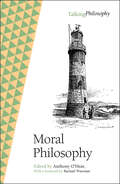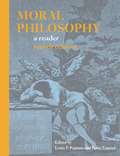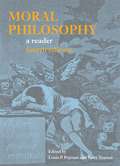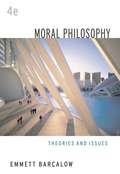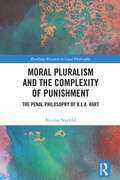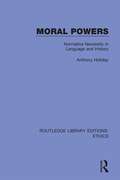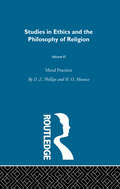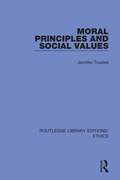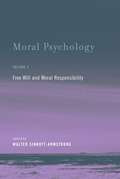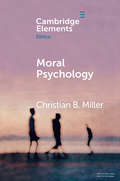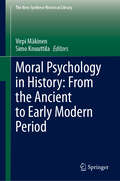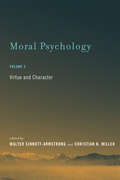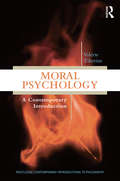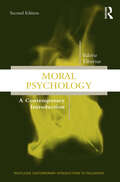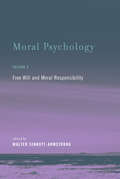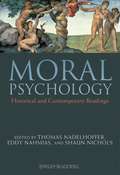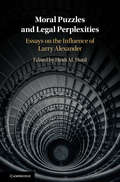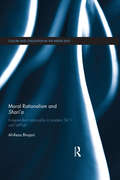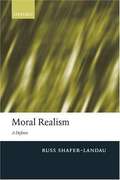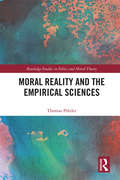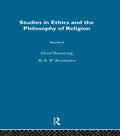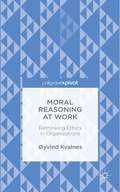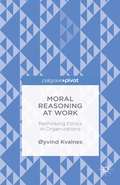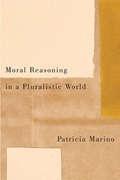- Table View
- List View
Moral Philosophy (Talking Philosophy)
by Rachael Wiseman Anthony O’HearWhat is moral philosophy? That is the question with which this important volume grapples. Its starting point is the famous critique made in 1958 by Elizabeth Anscombe, who argued that moral philosophy begins from a mistake: that it is fundamentally wrong about the sort of concept that the word 'moral' represents. Anscombe rejected moral philosophy as it was then (and mostly now still is) practised. She offered instead a blueprint for the task moral philosophers must embrace if they are to speak intelligibly to society about good and bad, right and wrong, duty and obligation. The chapters in this book are inspired by Anscombe's classic text. One of the most powerful voices here, among many authoritative voices, is that of Philippa Foot – Anscombe's lifelong friend – who asserts that 'any account of practical reason evacuated of an understanding of what human beings need to flourish is inadequate and must be rejected.'
Moral Philosophy: A Reader
by Louis P. Pojman Peter TramelThis collection of classic and contemporary readings in ethics presents sharp, competing views on a wide range of fundamentally important topics: moral relativism and objectivism, ethical egoism, value theory, utilitarianism, deontological ethics, virtue ethics, ethics and religion, and applied ethics.The Fourth Edition dramatically increases the volume's utility by expanding and updating the selections and introductions while retaining the structure that has made previous editions so successful.
Moral Philosophy: A Reader (Fourth Edition)
by Louis P. Pojman Peter TramelThis collection of classic and contemporary readings in ethics presents sharp, competing views on a wide range of fundamentally important topics: moral relativism and objectivism, ethical egoism, value theory, utilitarianism, deontological ethics, virtue ethics, ethics and religion, and applied ethics. The Fourth Edition dramatically increases the volume's utility by expanding and updating the selections and introductions while retaining the structure that has made previous editions so successful.
Moral Philosophy: Theories and Issues
by Emmett BarcalowThis core text in ethics devotes the first half to moral theory and the second half to contemporary moral issues. Designed for the beginning student with no background in philosophy, it is an understandable and engaging introduction to the range of theory and issues that are most pressing to today's students. First, an introductory chapter on moral reasoning provides a solid framework for evaluating and constructing moral arguments. Following that, one finds comprehensive coverage of all major ethical theories, including virtue ethics, natural law theory, divine command theory, and social contract theory. Finally, students get to see this theory in action amidst seven chapters devoted to important discussions in applied ethics.
Moral Pluralism and the Complexity of Punishment: The Penal Philosophy of H.L.A. Hart (Routledge Research in Legal Philosophy)
by Nicolas NayfeldThis book advances a new interpretation of Hart’s penal philosophy. Positioning itself in opposition to current interpretations, the book argues that Hart does not defend a mixed theory of punishment, nor a rule utilitarian theory of punishment, nor a liberal form of utilitarianism, nor a goal/constraint approach. Rather, it is argued, his penal philosophy is based on his moral pluralism, which comprises two aspects: value pluralism and pluralism with respect to forms of moral reason. It is held that this means, on the one hand, that criminal law has an irreducible complexity due to the compromises it makes to accommodate competing values, and on the other hand, that there need not be one single justification of punishment. This original interpretation is not based only on Hart’s key volume on the subject Punishment and Responsibility, but on a careful reading of his complete works. The book will be a valuable resource for academics and researchers interested in Hart’s philosophy, the philosophy of law and criminal law.
Moral Politics: How Liberals and Conservatives Think (2nd edition)
by George LakoffIn this classic text, the first full-scale application of cognitive science to politics, George Lakoff analyzes the unconscious and rhetorical worldviews of liberals and conservatives, discovering radically different but remarkably consistent conceptions of morality on both the left and right. For this new edition, Lakoff adds a preface and an afterword extending his observations to major ideological conflicts since the book's original publication, from the impeachment of Bill Clinton to the 2000 presidential election and its aftermath.
Moral Powers: Normative Necessity in Language and History
by Anthony HolidayOriginally published in 1986, this book subverts an attitude towards the moral dimension of life which the author terms ‘ethical cynicism’. It discusses a theory of moral powers – a theory which shows that moral values are immensely potent sources of power. The author argues that there is a conceptual affinity between the Wittgensteinian account of language and the Marxist theory of history such that the two complement and even require one another in various aspects.
Moral Practices Vol 6
by D.Z. Phillips H.O. MounceThis is Volume VI of nine in a collection of studies in Ethics and the Philosophy of Religion. Originally published in 1970, this volume looks at moral practices and the question which has puzzled philosophers: whether any value judgement can follow logically from the facts, can follow in such a way that someone who assents to the facts is bound in logic to assent also to the value judgement based upon them.
Moral Principles and Social Values
by Jennifer TrustedOriginally published in 1987, this book discusses how matters of fact influence moral judgments and also how the judgments themselves influence facts. It demonstrates that ethics is a practical subject affecting our moral assessment of inter-personal behaviour and the conduct of public affairs. It is designed as in introduction to moral philosophy for first-year undergraduates and provides an excellent basis for further study as well as serving as a valuable background text for those whose primary interests are in law, politics, sociology, social history and education.
Moral Psychology
by Walter Sinnott-ArmstrongTraditional philosophers approached the issues of free will and moral responsibility through conceptual analysis that seldom incorporated findings from empirical science. In recent decades, however, striking developments in psychology and neuroscience have captured the attention of many moral philosophers. This volume of Moral Psychology offers essays, commentaries, and replies by leading philosophers and scientists who explain and use empirical findings from psychology and neuroscience to illuminate old and new problems regarding free will and moral responsibility. The contributors -- who include such prominent scholars as Patricia Churchland, Daniel Dennett, and Michael Gazzaniga -- consider issues raised by determinism, compatibilism, and libertarianism; epiphenomenalism, bypassing, and naturalism; naturalism; and rationality and situationism. These writings show that although science does not settle the issues of free will and moral responsibility, it has enlivened the field by asking novel, profound, and important questions.ContributorsRoy F. Baumeister, Tim Bayne, Gunnar Björnsson, C. Daryl Cameron, Hanah A. Chapman, William A. Cunningham, Patricia S. Churchland, Christopher G. Coutlee, Daniel C. Dennett, Ellen E. Furlong, Michael S. Gazzaniga, Patrick Haggard, Brian Hare, Lasana T. Harris, John-Dylan Haynes, Richard Holton, Scott A. Huettel, Robert Kane, Victoria K. Lee, Neil Levy, Alfred R. Mele, Christian Miller, Erman Misirlisoy, P. Read Montague, Thomas Nadelhoffer, Eddy Nahmias, William T. Newsome, B. Keith Payne, Derk Pereboom, Adina L. Roskies, Laurie R. Santos, Timothy Schroeder, Michael N. Shadlen, Walter Sinnott-Armstrong, Chandra Sripada, Christopher L. Suhler, Manuel Vargas, Gideon Yaffe
Moral Psychology (Elements in Ethics)
by Christian B. MillerThis Element provides an overview of some of the central issues in contemporary moral psychology. It explores what moral psychology is, whether we are always motivated by self-interest, what good character looks like and whether anyone has it, whether moral judgments always motivate us to act, whether what motivates action is always a desire of some kind, and what the role is of reasoning and deliberation in moral judgment and action. This Element is aimed at a general audience including undergraduate students without an extensive background in philosophy.
Moral Psychology in History: From the Ancient to Early Modern Period (The New Synthese Historical Library #79)
by Simo Knuuttila Virpi MäkinenThis book provides a comprehensive study of major issues of moral psychology throughout history, from ancient to early modern philosophy. The volume focuses primarily on the Western history of philosophy but also deals with Jewish and Islamic heritage. The Introduction chapter lays out the historical background in broad strokes, giving the reader the “lay of the land” when it comes to the terms of analysis and their overall development within the Western tradition of moral psychology. The book continues by studying and analyzing moral anthropology, moral agency and motivation, virtues and social and political commitments, taking a thematic approach in a specific time-period and focus on the most unique and/or fruitful discussions about a particular historically situated discussion when it comes to thinking about questions and/or ‘problems’ in the field of moral psychology. Aimed at both a layman and academic audience, this book is of great interest to a broad readership.
Moral Psychology, Volume 5: Virtue and Character (Bradford Bks.)
by Walter Sinnott-Armstrong Christian MillerGroundbreaking essays and commentaries on the ways that recent findings in psychology and neuroscience illuminate virtue and character and related issues in philosophy.Philosophers have discussed virtue and character since Socrates, but many traditional views have been challenged by recent findings in psychology and neuroscience. This fifth volume of Moral Psychology grows out of this new wave of interdisciplinary work on virtue, vice, and character. It offers essays, commentaries, and replies by leading philosophers and scientists who explain and use empirical findings from psychology and neuroscience to illuminate virtue and character and related issues in moral philosophy. The contributors discuss such topics as eliminativist and situationist challenges to character; investigate the conceptual and empirical foundations of self-control, honesty, humility, and compassion; and consider whether the virtues contribute to well-being.ContributorsKarl Aquino, Jason Baehr, C. Daniel Batson, Lorraine L. Besser, C. Daryl Cameron, Tanya L. Chartrand, M. J. Crockett, Bella DePaulo, Korrina A. Duffy, William Fleeson, Andrea L. Glenn, Charles Goodman, Geoffrey P. Goodwin, George Graham, June Gruber, Thomas Hurka, Eranda Jayawickreme, Andreas Kappes, Kristján Kristjánsson, Daniel Lapsley, Neil Levy, E.J. Masicampo, Joshua May, Christian B. Miller, M. A. Montgomery, Thomas Nadelhoffer, Eddy Nahmias, Hanna Pickard, Katie Rapier, Raul Saucedo, Shannon W. Schrader, Walter Sinnott-Armstrong, Nancy E. Snow, Gopal Sreenivasan, Chandra Sripada, June P. Tangney, Valerie Tiberius, Simine Vazire, Jennifer Cole Wright
Moral Psychology: A Contemporary Introduction (Routledge Contemporary Introductions to Philosophy)
by Valerie TiberiusThis is the first philosophy textbook in moral psychology, introducing students to a range of philosophical topics and debates such as: What is moral motivation? Do reasons for action always depend on desires? Is emotion or reason at the heart of moral judgment? Under what conditions are people morally responsible? Are there self-interested reasons for people to be moral? Moral Psychology: A Contemporary Introduction presents research by philosophers and psychologists on these topics, and addresses the overarching question of how empirical research is (or is not) relevant to philosophical inquiry.
Moral Psychology: A Contemporary Introduction (Routledge Contemporary Introductions to Philosophy)
by Valerie TiberiusReleased in 2014, this was the first philosophy textbook in moral psychology, introducing students to a range of philosophical topics and debates such as: what is moral motivation? Do reasons for action always depend on desires? Is emotion or reason at the heart of moral judgment? Under what conditions are people morally responsible? Are there self-interested reasons for people to be moral? The Second Edition of Moral Psychology: A Contemporary Introduction, updates its responses to these questions, taking advantage of the explosion of recent research from philosophers and psychologists on these topics, and adding a chapter on the question of whether morality is innate or learned. As before, the book emphasizes the relationship between traditional and interdisciplinary approaches to moral psychology and aims to carefully explain how empirical research is (or is not) relevant to philosophical inquiry. The bulleted summaries, study questions, and lists for further readings at the end of each chapter have been updated. Key Updates to the Second Edition: Includes a new opening section on human nature, borrowing material from elsewhere in the book Adds a new chapter on evolutionary and developmental arguments for the innateness of morality Expands coverage of the challenges to psychological research, including the replication crisis and the WEIRDness challenge Provides a new section on implicit bias and moral responsibility Offers enhanced clarity and accessibility throughout Includes up-to-date further reading sections and bibliography
Moral Psychology: Free Will and Moral Responsibility (Bradford Books #Vol. 4)
by Walter Sinnott-ArmstrongLeading philosophers, psychologists, and neuroscientists address issues of moral responsibility and free will, drawing on new findings from empirical science. Traditional philosophers approached the issues of free will and moral responsibility through conceptual analysis that seldom incorporated findings from empirical science. In recent decades, however, striking developments in psychology and neuroscience have captured the attention of many moral philosophers. This volume of Moral Psychology offers essays, commentaries, and replies by leading philosophers and scientists who explain and use empirical findings from psychology and neuroscience to illuminate old and new problems regarding free will and moral responsibility. The contributors—who include such prominent scholars as Patricia Churchland, Daniel Dennett, and Michael Gazzaniga—consider issues raised by determinism, compatibilism, and libertarianism; epiphenomenalism, bypassing, and naturalism; naturalism; and rationality and situationism. These writings show that although science does not settle the issues of free will and moral responsibility, it has enlivened the field by asking novel, profound, and important questions. Contributors Roy F. Baumeister, Tim Bayne, Gunnar Björnsson, C. Daryl Cameron, Hanah A. Chapman, William A. Cunningham, Patricia S. Churchland, Christopher G. Coutlee, Daniel C. Dennett, Ellen E. Furlong, Michael S. Gazzaniga, Patrick Haggard, Brian Hare, Lasana T. Harris, John-Dylan Haynes, Richard Holton, Scott A. Huettel, Robert Kane, Victoria K. Lee, Neil Levy, Alfred R. Mele, Christian Miller, Erman Misirlisoy, P. Read Montague, Thomas Nadelhoffer, Eddy Nahmias, William T. Newsome, B. Keith Payne, Derk Pereboom, Adina L. Roskies, Laurie R. Santos, Timothy Schroeder, Michael N. Shadlen, Walter Sinnott-Armstrong, Chandra Sripada, Christopher L. Suhler, Manuel Vargas, Gideon Yaffe
Moral Psychology: Historical and Contemporary Readings
by Shaun Nichols Eddy Nahmias Thomas NadelhofferMoral Psychology: Historical and Contemporary Readings is the first book to bring together the most significant contemporary and historical works on the topic from both philosophy and psychology. Provides a comprehensive introduction to moral psychology, which is the study of psychological mechanisms and processes underlying ethics and morality. Unique in bringing together contemporary texts by philosophers, psychologists and other cognitive scientists with foundational works from both philosophy and psychology. Approaches moral psychology from an empirically informed perspective. Explores a wide range of topics from passion and altruism to virtue and responsibility. Editorial introductions to each section explain the background of and connections between the selections.
Moral Puzzles and Legal Perplexities: Essays on the Influence of Larry Alexander
by Heidi M. HurdDrawing inspiration from the profoundly influential work of legal theorist Larry Alexander, this volume tackles central questions in criminal law, constitutional law, jurisprudence, and moral philosophy. What are the legitimate conditions of blame and punishment? What values are at the heart of constitutional protections against discrimination or infringements of free speech? Must judges interpret statutes and constitutional provisions in ways that comport with the intentions of those who wrote them? Can the law obligate us to violate the demands of morality, and when can the law allow the rights of the few to be violated for the good of the many? This collection of essays by world-renowned legal theorists is for anyone interested in foundational questions about the law's authority, the conditions of its fair application to citizens, and the moral justifications of the rights, duties, and permissions that it protects.
Moral Rationalism and Shari'a: Independent rationality in modern Shi'i usul al-Fiqh (Culture and Civilization in the Middle East)
by Ali-Reza BhojaniMoral Rationalism and Sharī'a is the first attempt at outlining the scope for a theological reading of Sharī'a, based on a critical examination of why 'Adliyya theological ethics have not significantly impacted Shī'ī readings of Sharī'a. Within Shī'ī works of Sharī 'a legal theory (usūl al-fiqh) there is a theoretical space for reason as an independent source of normativity alongside the Qur’ān and the Prophetic tradition. The position holds that humans are capable of understanding moral values independently of revelation. Describing themselves as 'Adliyya (literally the people of Justice), this allows the Shī 'a, who describe themselves as 'Adiliyya (literally, the People of Justice), to attribute a substantive rational conception of justice to God, both in terms of His actions and His regulative instructions. Despite the Shī'ī adoption of this moral rationalism, independent judgments of rational morality play little or no role in the actual inference of Sharī 'a norms within mainstream contemporary Shī'ī thought. Through a close examination of the notion of independent rationality as a source in modern Shī'ī usūl al-fiqh, the obstacles preventing this moral rationalism from impacting the understanding of Sharī 'a are shown to be purely epistemic. In line with the ‘emic’ (insider) approach adopted, these epistemic obstacles are revisited identifying the scope for allowing a reading of Sharī'a that is consistent with the fundamental moral rationalism of Shī'ī thought. It is argued that judgments of rational morality, even when not definitively certain, cannot be ignored in the face of the apparent meaning of texts that are themselves also not certain. An 'Adliyya reading of Sharī'a demands that the strength of independent rational evidence be reconciled against the strength of any other apparently conflicting evidence, such that independent judgments of rational morality act as a condition for the validity of precepts attributed to a just and moral God.
Moral Realism: A Defence
by Russ Shafer-LandauMoral Realism is a systematic defence of the idea that there are objective moral standards. Russ Shafer-Landau argues that there are moral principles that are true independently of what anyone, anywhere, happens to think of them. His central thesis, as well as the many novel supporting arguments used to defend it, will spark much controversy among those concerned with the foundations of ethics.
Moral Reality and the Empirical Sciences (Routledge Studies in Ethics and Moral Theory)
by Thomas PölzlerAre there objective moral truths (things that are morally right or wrong independently of what anybody thinks about them)? To answer this question more and more scholars have recently begun to appeal to evidence from scientific disciplines such as psychology, neuroscience, biology, and anthropology. This book investigates this novel scientific approach in a comprehensive, empirically focused, partly clarificatory, and partly metatheoretical way. It argues for two main theses. First, it is possible for the empirical sciences to contribute to the moral realism/anti-realism debate. And second, most appeals to science that have so far been proposed are insufficiently empirically substantiated. The book’s main chapters address four prominent science-based arguments for or against the existence of objective moral truths: the presumptive argument, the argument from moral disagreement, the sentimentalist argument, and the evolutionary debunking argument. For each of these arguments Thomas Pölzler first identifies the sense in which its underlying empirical hypothesis would have to be true in order for the argument to work. Then he shows that the available scientific evidence fails to support this hypothesis. Finally, he also makes suggestions as to how to test the hypothesis more validly in future scientific research. Moral Reality and the Empirical Sciences is an important contribution to the moral realism/anti-realism debate that will appeal both to philosophers and scientists interested in moral psychology and metaethics.
Moral Reasoning Vol 2 (Studies In Ethics And The Philosophy Of Religion)
by R. W. BeardsmoreFirst published in 2003. Routledge is an imprint of Taylor & Francis, an informa company.
Moral Reasoning at Work: Rethinking Ethics In Organizations
by Ø. KvalnesThis book is open access under CC-BY license. Moral dilemmas are a pervasive feature of working life. Moral Reasoning at Work offers a fresh perspective on how to live with them using ethics and moral psychology research. It argues that decision-makers must go beyond compliance and traditional approaches to ethics to prepare for moral dilemmas.
Moral Reasoning in a Pluralistic World
by Patricia MarinoMoral diversity is a fundamental reality of today's world, but moral theorists have difficulty responding to it. Some take it as evidence for skepticism - the view that there are no moral truths. <P><P>Others, associating moral reasoning with the search for overarching principles and unifying values, see it as the result of error. In the former case, moral reasoning is useless, since values express individual preferences; in the latter, our reasoning process is dramatically at odds with our lived experience. Moral Reasoning in a Pluralistic World takes a different approach, proposing an alternative way of thinking about moral reasoning and progress by showing how diversity and disagreement are compatible with theorizing and justification. Patricia Marino demonstrates that, instead of being evidence for skepticism and error, moral disagreements often arise because we value things pluralistically. This means that although people share multiple values such as fairness, honesty, loyalty, and benevolence, we interpret and prioritize those values in various ways. Given this pluralistic evaluation process, preferences for unified single-principle theories are not justified. Focusing on finding moral compromises, prioritizing conflicting values, and judging consistently from one case to another, Marino elaborates her ideas in terms of real-life dilemmas, arguing that the moral complexity and conflict we so often encounter can be part of fruitful and logical moral reflection. Aiming to draw new connections and bridge the gap between theoretical ethics and applied ethics, Moral Reasoning in a Pluralistic World offers a sophisticated set of philosophical arguments on moral reasoning and pluralism with real world applications.
